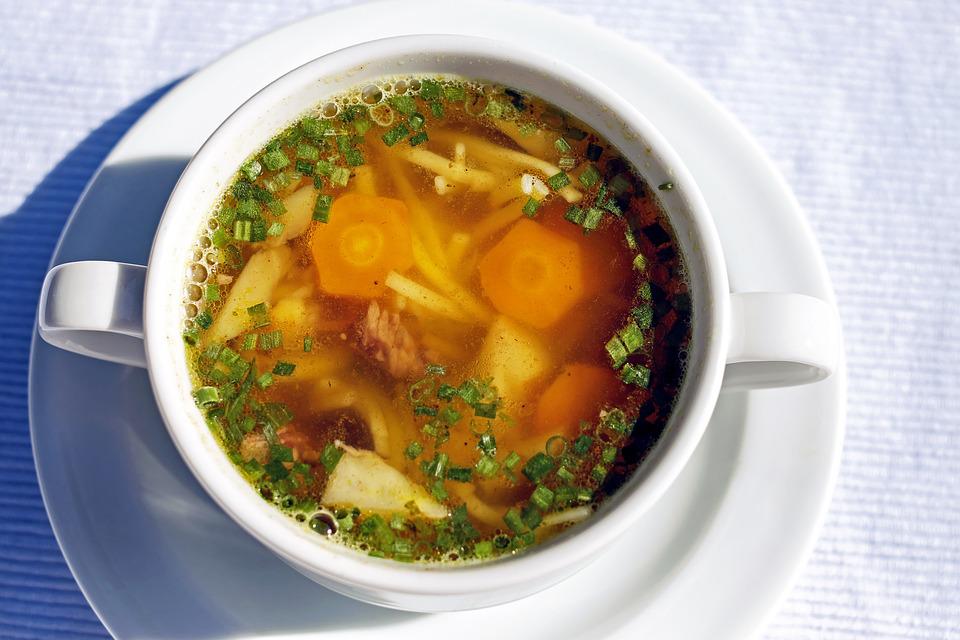Many of us have heard since childhood about how healthy soups are. It is believed that if you regularly eat the former, there will be no problems with the stomach, excess weight and digestion. We decided to check whether there is scientific evidence of the superiority of liquid food over solid food.
Many of us have known about the importance of soups since childhood. parents And grandmothers. In many In families, soup is still an obligatory part daily diet. Explain This is because anyone who does not eat soup will develop gastritis, stomach ulcers and intestinal problems. Countsthat soups are lower in calories, therefore ideal fit for those who want to lose weight. Among the advantages of soups are also indicate what kind of food it is allows the body warms up faster.
By calculations According to scientists, soups appeared in the human diet approximately 20,000 years ago. Ceramic shards with traces of fire were discovered in the Xianen Cave in China, in which our ancestors apparently prepared various stews. Unlike most modern recipes, those soups were based on various grains. Now soups included on the menu of many national cuisines - traditional cabbage soup in Russian cuisine, borscht in Ukrainian, zurek in Polish, goulash in Hungarian, tom yum in Thai, bouillabaisse in Mediterranean or minestrone in Italian.
Modern soup most often consists of vegetables and/or meat that are cooked in gradually heated water. Depending on the recipe, vegetables and meat may be pre-cut into pieces, and the ingredients may also be pureed. Soups are served both hot and cold. There is no denying the fact that soup is a source of liquid, and therefore is able to maintain the body’s water balance. According to data According to the American Journal of Clinical Nutrition, consuming a low-energy broth-based soup as a first course is more satiating than a similar solid food taken with the same volume of water. Research also showedthat soup lovers have lower body weight and waist size, and are also less likely to suffer from obesity. At the same time, scientists note that the mechanisms underlying this pattern require further research.
It is important to note that it is a mistake to consider soup to be a healthier and lower calorie food. The average portion of the first varies from 250 to 500 g. Thus, a plate of borscht will be contain from 140 to 285 kcal depending on volume, which comparable, for example, with a couple of cheesecakes. And here is the same portion of cream of chicken soup will give the body already has from 367 to 735 kcal, which is comparable to Big Mac from McDonald's (503 kcal per serving). More calorie soups does frying, especially cooked in sunflower oil (which may also contain trans fats), broth cooked with skinned chicken, adding pickles and smoked foods to the dish.

It is also incorrect to believe that drinking soup can protect against gastritis and the development of stomach ulcers. These diseases do not arise from poor nutrition. According to modern scientific data, a stomach ulcer is a bacterial disease caused by the microorganism Helicobacter pylori. Scientists who proved the bacterial nature of stomach ulcers in 2005, received Nobel Prize. Today, more than 50% of humanity infected Helicobacter pylori, in some countries (for example, Egypt, Ethiopia and Mexico) - up to 90%. At the same time, the mere presence of bacteria in the digestive tract does not mean the immediate development of the disease, since a healthy gastric mucosa protects the organ from the harmful effects of the microorganism. Main provoking factors illness - taking non-steroidal anti-inflammatory drugs (aspirin, ibuprofen, diclofenac, etc.), smoking And genetic predisposition.
Therefore, no matter what ingredients are included in the soup, it alone is not able to protect the body either from Helicobacter pylori infection or from the development of gastritis or stomach ulcers. At the same time, therapeutic diet (table No. 1) for an existing stomach ulcer includes soups from pureed cereals, potatoes and vegetables (except cabbage), as well as milk soups with vermicelli, noodles, rice and semolina, and meat and fish broths, vegetable and mushroom decoctions strictly prohibited. Also meat and fish broths not recommended for diseases of the gallbladder, biliary tract and liver. Soups with beets, carrots, potatoes won't fit for diabetics, since when these vegetables are cooked in water, their glycemic index increases.
The opinion that soup is better digestible because it consists of smaller pieces is also erroneous. There is food in the stomach turns into chyme - a puree of particles until 1–1.2 mm in diameter, mixed with gastric juice, no matter how large the pieces were on the plate initially. And the main process of nutrient absorption is happening further, already in the intestines. Moreover, understanding the digestive process also disproves the idea that soup can provide more warmth than solid food. Any food in the stomach heats up or cools down to body temperature in a relatively short time (up to five minutes), so heat generation directly depends only on the composition of the food: the more protein, the warmer the body. In 100 g chicken broth contained on average 2.9 g of protein, while chicken fillet has almost ten times more - 21 g. Therefore, from the point of view of thermogenesis (heat production), solid chicken fillet will be much better than liquid broth.
IN modern nutritional recommendations, based on large scale research, there is no mention that liquid food must be present in the diet.
Thus, in general, soups do not have any unique valuable characteristics. Low-calorie light vegetable soups can be useful for those who are watching their figure. True, to the same extent as the vegetables themselves. For some diseases, your doctor may recommend including some soups in your diet and excluding others. But liquid food itself will in no way protect against diseases of the digestive tract. The harm or benefit of soup, like any other dish, is determined only by its composition, method of preparation, and portion size.

Not true
Read on the topic:
- The way of the apple: what happens to food when it enters our body
- Slideshow: See how your digestive system works
- Is it true that stress can cause stomach ulcers?
If you find a spelling or grammatical error, please let us know by highlighting the error text and clicking Ctrl+Enter.






